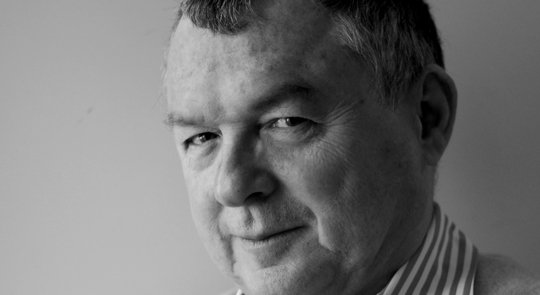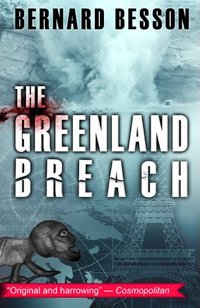 When you read a thriller by Bernard Besson, you can be pretty sure he knows what he is talking about. The author is a former chief of staff for the French intelligence services, and now runs a successful consultancy specialising in economic intelligence and business advice for large corporations. Alongside his specialist non-fiction books, since 1998 he has also written a number of prize-winning thrillers that happily straddle the divide between international espionage fiction and down-to-earth crime. His latest book, The Greenland Breach, is the first to be translated into English. With environmental concerns, large corporations and a conspiracy at its core, it’s been described as a stylish cli-fi thriller. The book comes out 30 October. MarinaSofia asked the author to tell us more…
When you read a thriller by Bernard Besson, you can be pretty sure he knows what he is talking about. The author is a former chief of staff for the French intelligence services, and now runs a successful consultancy specialising in economic intelligence and business advice for large corporations. Alongside his specialist non-fiction books, since 1998 he has also written a number of prize-winning thrillers that happily straddle the divide between international espionage fiction and down-to-earth crime. His latest book, The Greenland Breach, is the first to be translated into English. With environmental concerns, large corporations and a conspiracy at its core, it’s been described as a stylish cli-fi thriller. The book comes out 30 October. MarinaSofia asked the author to tell us more…
How would you describe The Greenland Breach, in a nutshell?
The world is experiencing global warming and people are wondering why that is the case. A French research vessel is bringing back samples of ice from beneath the polar caps, samples which have a story to tell about climate change and its consequences. This is dangerous knowledge, with profound geopolitical implications, and it sparks a deadly struggle between two big corporations – ship’s owner, Terre Noire, and North Land, their North American rival.
Your novels are always so topical. In previous books you described China’s economic dominance and the consequences of Islamic fundamentalism, now you’re tackling global warming. What inspires you?
I am fascinated by what the future holds for this planet, both medium and long-term. I start off with an isolated dramatic real event, and then I imagine all sorts of actions and motives which might have triggered that, whether it’s national politics, or a religious group or a corporation, the secret services, the Mafia or a terrorist group. Financial and climate issues, and also medical or religious ones, provide a great backdrop against which your characters can act in rather intriguing ways to pursue their goals. Sometimes they act in a logical or realistic way, and sometimes they can be absolute monsters.
 What sparked off the writing process for this novel ?
What sparked off the writing process for this novel ?
I started writing the book because I kept asking myself, as we all do, just how much we humans are to blame for global warming. And I found out that the answer is not as simple or obvious as one might expect. I discovered that Greenland really did use to be green in the Middle Ages, and that the Vikings who lived there back then may have died of cold when the climate suddenly changed. This troubled me, so I did some more research into this topic.
Your novels do require a considerable amount of research – how do you go about it ?
In this case, I asked geologists and glaciologists about their latest research. I also read up on historical accounts of Dutch or French explorers who went to the Great North. Above all, I discovered a fascinating character for my novel: Greenland itself, a land of suffering and legends.
You also run a busy business consultancy on economic intelligence. How do you manage to combine work and writing?
Writing fiction makes me imagine and invent things, but to tell you the truth, business innovations are likewise a product of the imagination. I also find that the problems faced by business organisations also inform my characters, who are often entrepreneurs leading French, American or Asian firms that are changing the world in some way.
I try not to overburden myself: I am lucky enough to be able to turn down work, and write just those books that I find personally interesting. I hope that my readers can feel how much of myself I put into the books – the fear or the laughter – and replicate some of those feelings.
Which authors inspire you ?
I like American authors a lot, because I find them quite violent, but often surprisingly poetic and mysterious. This mix is a huge strength of Anglo-Saxon literature. I believe that crime fiction is a mirror of society – it’s psychology and sociology combined. A crime set in New York or Paris gives you the most intimate, fascinating insight into the culture of the United States or France. You can dare to say things in fiction, via your characters, that you might not otherwise admit, even to yourself.
I am particularly fond of Conan Doyle. He has such an ability to make things mysterious and frightening. Holmes has the kind of logical mind which to me seems very French. I re-read The Hound of the Baskervilles every year.
Finally, what other projects are you currently working on?
Partage des Terres, the sequel to the Greenland Breach, will be out on 30 October in France. The readers have the opportunity to reacquaint themselves with the three main characters working for Fermatown, and this time their adventure will take them to Malaysia. Rare earth metals are highly valued for their use in many high-tech industries. China has got near-monopoly status and has been required to work together with the rest of the world to create a transparent, reputable marketplace. There are two market hubs for the trade in rare earth metals in the world: Paris and Putrajaya, near Kuala Lumpur. All is well until a former president of France, who has just narrowly escaped from a plane crash, is found hanging at his home in Paris.
I am also working on a historical novel set in 1962, in the weeks before, during and after the Cuban missile crisis. It is based on some real events which I was privy to in my old job. Part of the action takes place in the Kremlin and the White House, of course, but things get really knotty at the Chateau Vaux le Vicomte near Paris.
I would also love to write a historical novel about the beginning of the French monarchy in fifth century AD, but my friends assure me that no-one would want to read anything as boring as that. Shame – what an intriguing period that was!
The Greenland Breach will be released in English on 30 October by Le French Book.








